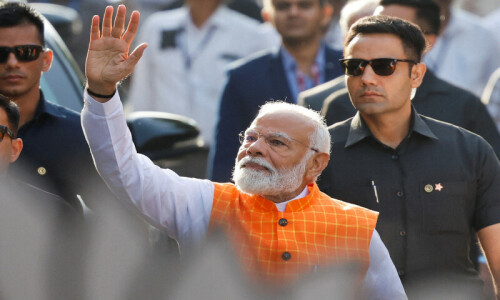THE Islamophobic rhetoric being employed by Narendra Modi for this election campaign has become shrill. Pakistan has nearly always been an electoral issue in India.
However, this time, it is Indian Muslims who are bearing the brunt of the Indian prime minister’s hate speech. Speaking in Rajasthan last month, he called Muslims “infiltrators” and said they produce too many children. In Gujarat, where, as chief minister, he had overseen the massacre of Muslims in 2002, he accused the Congress of seeking to “loot” India’s wealth and redistribute it among Muslims, and of organising a ‘vote jihad’ against his leadership. Later, he accused the Congress and Muslims of stealing Hindu wealth and property.
Modi’s inflammatory rhetoric was followed by the BJP’s campaign video portraying Muslims as outsiders who plundered India’s wealth. As concerns grew about communal violence, the video was removed. These allegations are a sequel to Modi’s public referencing of earlier conspiracy theories of ‘love jihad’ (Muslims forcibly converting Hindu women and marrying them to increase the Muslim population) or ‘land jihad’ (capturing land to construct religious structures and gaining control of India’s territory). Concerns that his rhetoric might incite further violence against Indian Muslims are increasing.
Ordinarily, since Hindus are in a majority in India, it may be difficult to question the rationale of creating a Hindu state. However, two observations are in order. One, the expansionist designs of the cherished Hindu state seek the creation of an Akhand Bharat, a Hindu right fantasy, which would violate the territorial integrity of Nepal, Bangladesh, Pakistan, and Afghanistan, as per a map displayed in the new parliament building. This is not acceptable to the aforementioned independent states.
Two, though the creation of a Hindu state should not translate into discrimination against minorities, regrettably this will be the case. The works of French political scientist Christophe Jaffrelot illustrate how Muslims, 14.5 per cent of India’s population, are grossly underrepresented in bureaucracy, the judiciary, police, and legislative organs. They are second-class citizens.
The Muslim-majority area of Indian-occupied Jammu and Kashmiri is also being subjected to demographic engineering. The destruction of the centuries-old Babri Masjid by Hindu zealots in 1992 and the construction of a temple in its place has set a precedent that might be followed for other historic mosques. This contrasts sharply with the UAE’s gesture of permitting a Hindu temple in Abu Dhabi.
Modi’s anti-Muslim rhetoric is raising concerns of violence.
Analysts are also pointing out the fascist tendencies of the BJP regime, a steep decline in democratic values, and a departure from the moorings of pluralism and secularism on which modern India was founded. In her book The Incarcerations, Alpa Shah contends that Modi’s India is using its national security apparatus to incarcerate ordinary citizens for their dissenting views. Commenting on the book, Arundhati Roy stated that this was about criminalisation and incarceration of dissent itself.
Strikingly, the Modi regime has also used art and culture to project the Hindutva philosophy. Kunal Purohit’s book H-Pop: The Secretive World of Hindutva Pop Stars shows how Hindutva pop stars and influencers are being used to spread the message of Hindu supremacy and create acceptance of Hindutva’s core beliefs.
Apart from this, Modi is playing on his government’s accomplishments: making India the world’s fifth largest economy; the construction of 50,000 kilometres of national highways; boosting India’s military spending; building Vikrant, India’s first domestically built aircraft carrier; and the Chandrayaan-3 moon landing.
His prospects of winning a third term have been bolstered by a weak opposition. Despite the formation of the Congress-led 37-party INDIA coalition, there is no real challenge. What has bolstered his outreach is India’s enhanced global standing. In his book Why Bharat Matters, S. Jaishankar presents India as a leader of the global south and makes a case for the rejuvenation of India as a civilisational state.
There are some lessons that Pakistan could learn from India’s electoral process. One, despite the large scale of India’s elections (969 million registered voters; 1m polling stations) and the use of electronic voting machines, election results are largely accepted without much ado. Two, there is no caretaker government, as the incumbents become ‘caretakers’ in a way, and refrain from announcing major policy decisions or sanctioning expenditure for development schemes.
If Modi wins a third term, he is likely to maintain his pro-Hindutva, anti-Muslim, and hegemonic attitude towards regional countries, particularly Pakistan.
The write is a former foreign secretary and chairman of Sanober Institute Islamabad.
Published in Dawn, May 12th, 2024
































